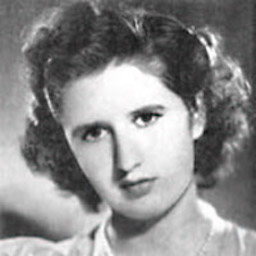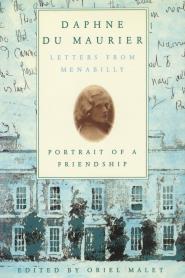We wonder how many young writers have dreamed of an older, more experienced author taking her under her wing. Well, this was Oriel Malet’s luck one evening in the early 1950s.

Auriel Rosemary Malet Vaughan, born into an aristocratic family in 1923, was hardly a novice. She had written her first book Trust in the Springtime when she was seventeen, been a winner of the John Llewellyn Prize for Young Novelists, and enjoyed international success. The party at which she would meet Daphne du Maurier was being hosted by Ellen Doubleday, the wife of both authors’ American publisher.
But despite these early achievements, Malet still considered herself something of an outsider to the capital’s literary scene. When she arrived to find the hotel suite address locked-up and silent, she felt relieved at the excuse it provided for beating a hasty retreat.
But just then she heard a voice close by, and turned to see another woman also waiting alone. The two soon fell into easy conversation, passing over small talk for enthusiastic discussions about ‘books, the theatre, Paris, Life’. Neither one seems to have felt the need to introduce herself by name, and so by the time Doubleday arrived – full of apologies and ushering in a brigade of waiters carrying silver dishes of food and buckets of iced champagne – Malet remained unaware that she had been talking to the celebrated Daphne du Maurier.
When the young woman discovered the truth, she was embarrassed. Fearing what faux pas she might make next, she decided to try to creep out of the party unnoticed. She’d almost made it to the door when she saw that du Maurier was doing exactly the same thing.
Downstairs, the pair escaped in a taxi and ended up going to du Maurier’s London flat, on the King’s Road in Chelsea. When they said goodbye later that evening, Malet, found herself feeling sorry that her path was unlikely to cross again with du Maurier’s.
But not long afterwards, while riding the motorcycle she’d bought with her John Llewellyn Prize winnings, Malet crashed into a closed gate which ‘should have been open but was mysteriously closed’. When word reached du Maurier about what had happened, she invited the young author to recuperate at Menabilly, the grand country house where she lived in Cornwall, and the inspiration for her most famous novel Rebecca.
This marked the start of a friendship spanning over thirty years, and one that came to an end only with du Maurier’s death in 1989. Over the period, they wrote to each other regularly, and du Maurier’s half of the correspondence – later collected and published by Malet in Letters From Menabilly – charts the development of their literary relationship.

In its earliest days, du Maurier signed off using ‘Daphne’, but switched to the nicknames ‘Bing’, ‘Tray’ or ‘Track’ as the pair grew closer. She wrote about her family and friends, her reading and writing, and sent advice to Malet on literary matters. The names of other authors crop up frequently in her letters – both those of contemporaries and the forebears who inspired her, Katherine Mansfield, Elizabeth Gaskell, and the Brontë sisters in particular.
Du Maurier would eventually write a biography of the Brontës’ brother Branwell, and she and Malet made a pilgrimage to the Parsonage in Haworth in the 1950s – still a quiet spot in those days, not yet on the tourist trail.
Although du Maurier’s is, as one would expect, the voice that dominates the book’s pages, Malet’s frequent interjections do much more than put the letters in context. They give a sense of the younger woman’s loyalty, her inquisitive nature, and most of all her enormous affection for her friend du Maurier.
Special thanks
We are grateful to two of our readers, Anne Hall and Jenny McAuley, who answered our open request for information about a literary friend of Daphne du Maurier’s by letting us know about Oriel Malet.
Activity
When we read Daphne du Maurier’s words ‘Dearest Oriel, Your great long letter arrived this morning’, we wished we were able to tell exactly what Malet had said. Over the time we’ve been running Something Rhymed, we’ve often speculated about the gaps that remain, through lack of solid evidence, in what we can know about the friendships we’ve profiled. This month, we will each take a look at just a few of these gaps. We’ll write about what draws us to these particular mysteries, and the stories we think we can piece together.

What a brilliant post. I loved the idea that they were both trying to sneak out of the party. I suspect there are number of authors at parties and events who are standing there desperately wondering how soon they can creep away.
Yes, I suspect so too! Thanks for letting us know that you enjoyed the post, Karen. We hope everything is going well for The Raven’s Head, and what you are working on now.
Love this friendship and the way it began, I’ll definitely have to read Letters from Menabilly. I love du Maurier but had never heard of Malet, which is a shame.
Hi Andrea. Thanks for commenting. If you’re a fan of du Maurier’s stories, I think you’ll enjoy Letter From Menabilly. Another interesting book, if you haven’t read it already, is du Maurier’s memoir Myself When Young. As you’d expect, some of the same people she knew appear in both books.
I love the insights you give into women’s literary friendships. This one reminds me how chance can sometimes play a key role in those pivotal moments in one’s life. How lucky was Oriel Malet?I admire Daphne du Maurier for not letting on who she was, perhaps enjoying the conversation and not wanting her fame to get in the way. Thank you for the book recommendations: I now have two more to add to my TBR pile!
Thanks for taking the time to let us know that you enjoyed this, Sue. What you say about chance is so true. I met one of my closest literary friends when we both showed up at the wrong room for a meeting. These really are pivotal moments aren’t they. We know that’s true of meeting a partner but also true of meeting a lifelong friend. Enjoy your reading!